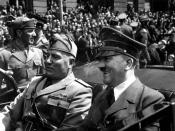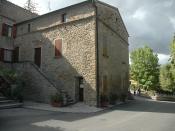The national elections of November 1919 were the most significant in Italy since the political and territorial reunification of 1870. These were the first elections to take place under mass political democracy. All men were given the vote and the electoral law of August 1919 meant that a system of proportional representation was in place.
The idea of mass democracy was very different to what had been in place since unification in 1870 to 1912 when near universal male suffrage was provided. The parliament had been controlled by the liberal nationalist minority drawn from the educated and propertied middle class and the liberal aristocracy.
This parliament faced many problems; banditry and unlawfulness in the south and the Catholic churches open hostility to the new state which led to the Pope's "non expedit decree of 1874" banning Catholics from taking part in elections. Italy had no feelings of being a unified country.
Many people resented the unification.
The majority of Italy was banned from politics and so this left the running of the country to a small minority. Therefore politicians adopted the policy of transformismo which helped high ranking politicians to form a kind of party around them through the promise of patronage and political help. This did not help the country because landowners in the South gave their votes in Parliament in return for the slowing down of laws they did not want. Such things were fairly commonplace and so Parliament helped the liberal minority not necessarily the common people.
Giolitti tried to confront these policies by trying to get the Catholic and Socialist support but still could not break free of transformismo policies which gave his government power. The 1912 near universal male vote was an attempt to keep socialist support.
The decision to go to war in 1915...
![[Forum Boario, Rome, Italy] (LOC)](https://s.writework.com/uploads/17/171586/forum-boario-rome-italy-loc-thumb.jpg)


Italy
Yours is a good essay on the effects of World War I on Italy and the growth of Fascism. It is often said that one of the main causes of World War II was the First World War and this can be seen clearly in the situation regarding Italy. Good job!
7 out of 7 people found this comment useful.